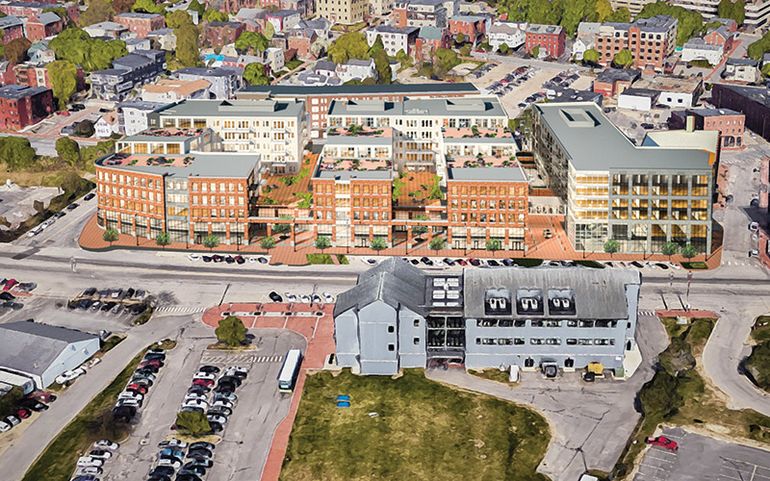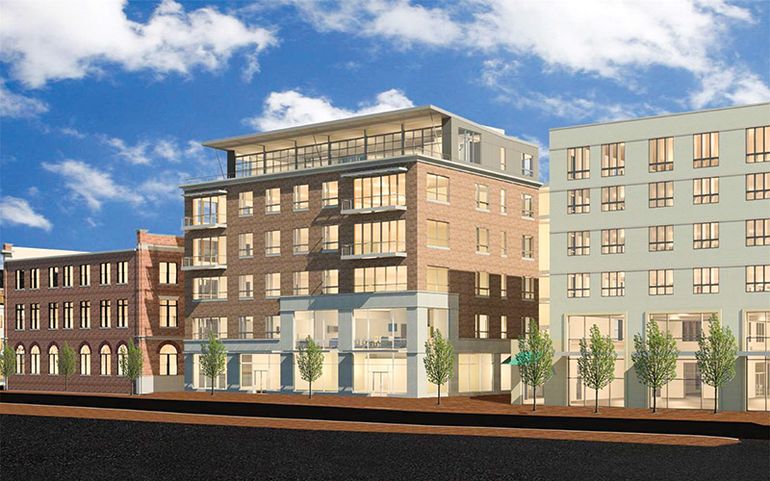Processing Your Payment
Please do not leave this page until complete. This can take a few moments.
Reshaping Portland's waterfront: A flurry of development east to west in Maine's largest city
Lobster traps, buoys, barrels and industrial buildings dot Portland's Union Wharf, owned by the Poole family for more than two centuries.
Brothers Charlie and Malcolm Poole lease space to 25 tenants and 15 boats that tie up on the pier, all part of Portland's prized working waterfront.
As they seek new tenants and income sources, the brothers are having a three-story office built at the adjacent Widgery Wharf, which they also own. They're planning two more buildings of commercial and retail space on Commercial Street in what is to be the first large-scale project under 2010 zoning that allows for more non-marine waterfront land use under certain conditions, including providing money to invest in marine infrastructure.
“It's very expensive to take care of one of these properties, and the marine industries can only afford to pay so much,” says Charlie Poole. “We need the diversification of our tenant base to ensure that we can keep the maritime commercial infrastructure repaired and up to speed.” Malcolm Poole adds: “For our generation, our family, this is an opportunity to reinvest in Portland.”
That puts the siblings front and center of a waterfront development boom set to reshape Portland, as Maine's biggest city struggles to strike the right balance between attracting more tourists and businesses and keeping neighborhoods livable and affordable.
'Awesome responsibility'
City officials, who laid the groundwork for transforming the waterfront two decades ago, are thrilled at what's happening now.
“It's a wonderful time to be involved in development in Portland and its history, but it's an awesome responsibility we take seriously,” says Greg Mitchell, the city's economic development director. Sitting next to him in a City Hall room with stacks of maps against the wall, waterfront coordinator Bill Needelman speaks of “a development phase that'll be recognized 100 years from now.”
The city government intends to play an active role in the transformation, not just in vetting the growing list of projects that come before the Planning Board, but also through longer-term ambitions of its own to turn the hulking Portland Ocean Terminal on the Maine State Pier into a mixed-use space anchored by a public seafood market and business incubator, and to turn the vacant Amethyst parking lot between Ocean Gateway and the Portland Co. on Thames Street into a public open space with waterfront access.
City officials are encouraged by the flurry of private development elsewhere on the eastern waterfront, where there are three active construction sites.
Near Portland's Ocean Gateway Pier, construction is underway at WEX Inc.'s future global headquarters, being developed by Jonathan Cohen of O Hancock LLC and set to be completed in 2019, and at the Twenty Thames luxury condominium complex and AC Hotel by Marriott being developed by Ara Aftandilian of EssexNorth Portland LLC. WEX spokesman Rob Gould said the new campus will have space for 400 to 450 employees, while other employees will stay put in South Portland. Including contract workers, WEX currently employs 1,000 in South Portland.
Close to Shipyard Brewing Co. and Micucci Grocery on India Street, the privately owned Ocean Gateway Garage is getting a long-awaited facelift and structural add-ons. They include a new five-story building at 16 Middle St., the new home of Tilson Technology Management on floors three and four and Benkay Japanese Restaurant at street level.
“It's beautiful, just a great space for us,” says Tilson CEO Joshua Broder, who employs 100 people in Portland and 400 nationwide, but says there's room for up to 150 in the new space. The millennial-friendly open-plan set-up takes up 16,000 square feet. “It felt expensive,” Broder says, “but it had a good value proposition so we went for a new ultra-modern space.”
Broder notes that employers like Tilson and their soon-to-be-neighbor WEX are “competing for the best employees in the world,” and one way to lure talent is with an attractive workspace.
Nearby, at 58 Fore St., a 10-acre former industrial site is eerily quiet — but not for long. That project is nearing the starting gate after Jim Brady spent four years navigating hurdles to turn the historic site into a new neighborhood. The plan includes a boat marina and public plaza, and is now in the hands of Casey Prentice and Kevin Costello of CPB2 LLC as Brady turns his attention to other projects in Portland and Biddeford.
The Old Port and farther west
Back in the Old Port, F.L. Putnam Investment Management Co. has already signed a lease for the top floor of the Pooles' Widgery Wharf office building as Malone Commercial Brokers seeks tenants for the other two floors. F.L. Putnam employs 12 people in Portland with plans to hire three more, says Tom Manning, the company's president.
During a recent interview in Portland, Manning explained that the firm had outgrown its space at 245 Commercial St. but wanted to stay in the area. “Once you have a view of the water,” he says, “you really don't want to lose that.”
Pierce Atwood's Dennis Keeler, who helped facilitate the law firm's 2011 move to Merrill's Wharf, says now that its $10 million investment in what was then a forgotten part of the waterfront was worth it.
“It was a bit of a risk coming here … but all of a sudden, this has become an area that's getting attention,” Keeler says.
That's also true of the western waterfront, where Reger Dasco Properties received the go-ahead in December to put up a 139-room hotel and condominium complex at the former Rufus Deering Lumber site, Portland Yacht Services owner Phineas Sprague is planning a new marine complex and Americold LLC will build its long-awaited cold storage facility.
Three miles to the west, along the Fore River, Chris Thompson of Thompson's Point Development Co., is targeting a spring or summer construction start for a 148-room boutique hotel and the new Children's Museum and Theater of Maine.
“Our sense has always been that at a point of critical mass at Thompson's Point, a hotel was both necessary and would sustain itself,” he says.
Avoiding a bubble
Not everyone is a fan of Portland's development boom, and what happens if another downturn strikes in a city already grappling with traffic congestion and rising property values.
“With all these hotels going in, that's great, but you don't want this to be simply a tourist city,” says Joseph McDonnell, a professor at the University of Southern Maine's Muskie School of Public Service. “You want this to be a city where people want to live because of the lifestyle that you have created through good plans.”
He and others noted in a 2017 report that Portland employers face a formidable challenge replacing an aging workforce, and that they will only succeed if the city can attract and retain the next generation of skilled workers with things like affordable housing and quality architecture.
“We can't just allow buildings to pop up helter-skelter without consideration of whether we are creating a beautiful city that will be attractive both for tourists and for the people who live here,” he says.
And Dana Totman, president and CEO of Avesta Housing, says that while the burgeoning commercial construction is good for the economy, the tax base and jobs, that's a “vivid contrast” to affordable-housing activity that's been lumbering along for the past few years. He laments the fact that contractors are so busy with commercial projects “so that when we are lucky enough to have one of those new housing developments to build, the contractors are sometimes so busy and not interested.”
That happened when Avesta sought bids from five general contractors and two dropped out early because they were too busy. “Contractors are less eager to come get our work … so it's more expensive to build, and we have to cobble additional resources from other sources to pay for the extra costs. We're able to do that with the few projects we have. The bigger issue is, we don't really have enough projects.”
From a developer's perspective, Jim Brady concedes there's always a danger of putting up too many hotel rooms, offices or residential units.
“If Portland continues to attract businesses and generate good jobs and have a good quality of life,” he says, “my hope is that demand will continue to be there, and hopefully there will be some prudent lenders and developers who are very careful about the supply that they add to the market.”
Joe Dasco, principal at Reger Dasco, is equally bullish on Portland as the company decides on a partner to buy and operate the future hotel at the Rufus Deering site. “Portland's a great city,” he says. “We think it's going to continue to grow and hopefully grow at a moderate pace.”
Read more




















Comments